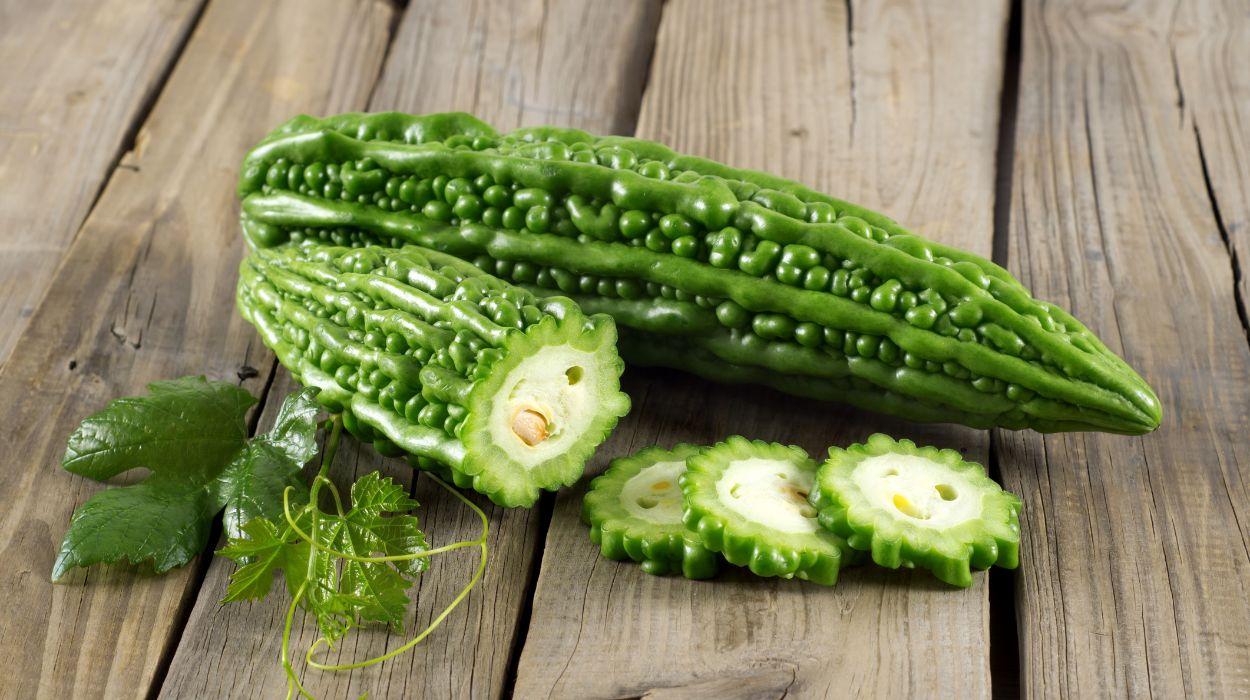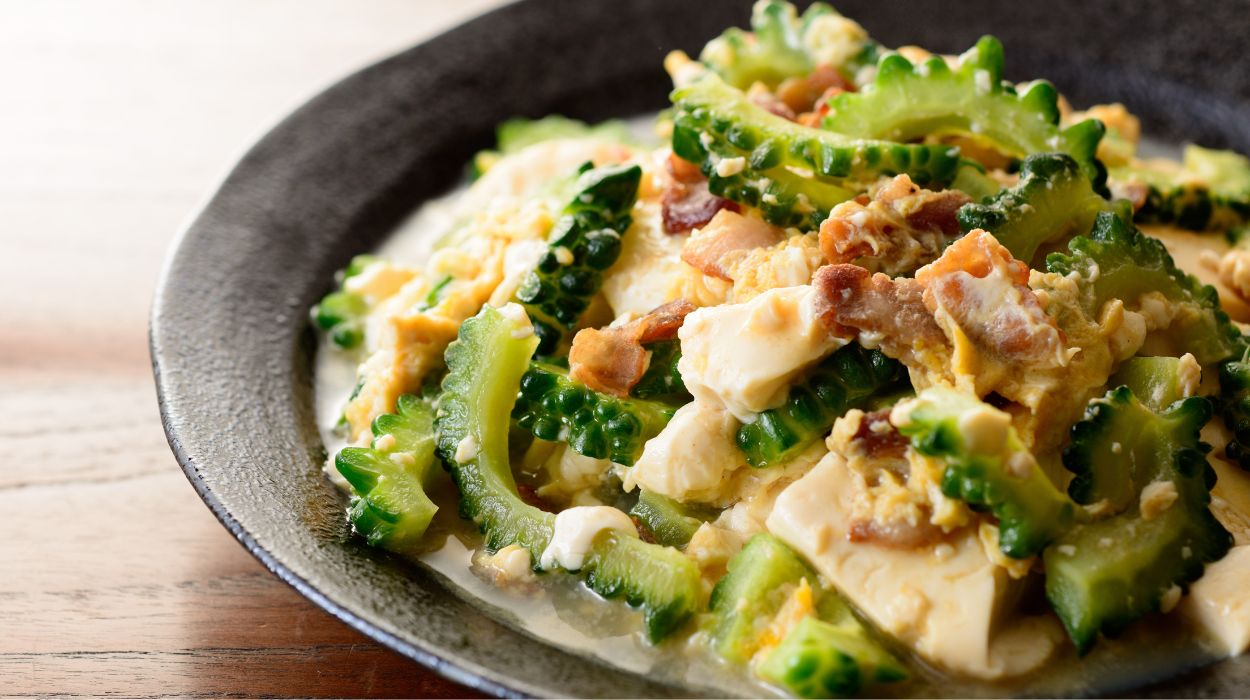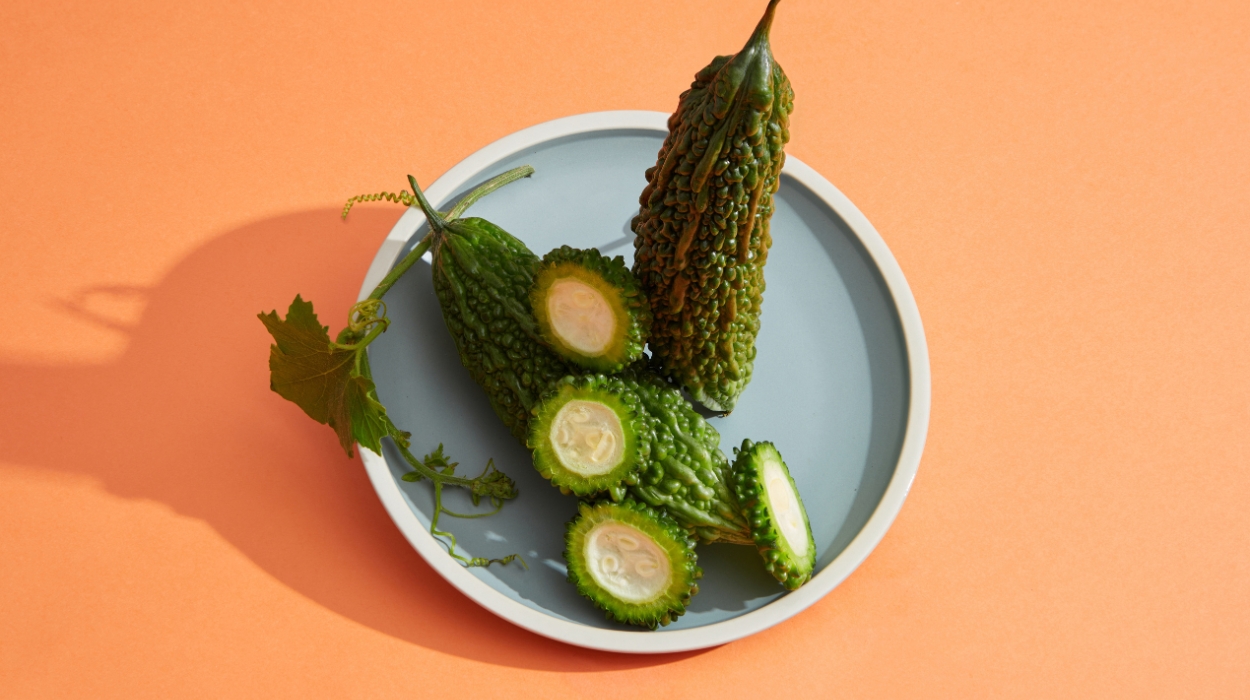Most of us know that fruits and vegetables are healthy. However, we probably imagine eating typical produce, such as apples or carrots.
However, less common fruits and veggies come with serious health benefits as well. Some of them can even help with weight management. The bitter melon,[1] also called bitter gourd, is among the top fruits and vegetables for weight loss.
Below, learn about proven bitter melon benefits. After discovering the numerous benefits of this fruit, you may be compelled to add it to your diet. As you will find, this fruit is good for much more than just weight reduction.
Unlike apples and oranges, you may not be able to find it on your grocer’s shelves. If you get creative, though, you can find ways to add it to your diet.
What Are The Benefits Of Bitter Melon?
Bitter melon could come with the following benefits:
- Treatment of inflammation.
- Reduction in blood sugar levels.
- Decrease in low-density lipoprotein cholesterol.
- Increase in energy levels.
- Cancer prevention.
- Potential treatment of infections.
- Improved digestion.
- Treatment of arthritis.
- High antioxidant content.
- Weight reduction.
- Decrease in blood pressure.
Amazing Health Benefits Of Bitter Gourd

Bitter melon, or bitter gourd, is a medicinal plant[2] found in tropical and subtropical regions. Most bitter melon varieties are found in Africa, but some are found in Asia and Australia. The bitter gourd offers several purported benefits, and this plant is widely used for medicinal purposes.
Below, learn about the main advantages of bitter melon, known by its scientific name, Momordica charantia. Soon, you’ll understand why this can be considered one of the healthiest fruits.
Treatment Of Inflammation
Among the top bitter gourd benefits are its anti-inflammatory effects. Research has demonstrated that bitter melon extracts can reduce inflammation[3] and reduce the expression of proinflammatory markers.
Given its anti-inflammatory effects,[4] bitter melon extracts may help treat pain. Its extracts can also be beneficial for wound healing.[5]
Reduction In Blood Sugar Levels
Bitter melon is widely used for blood sugar control. One recent study found that peptides[6] from bitter melon reduced average blood sugar readings over time.
Other research has shown that bitter melon extract can reduce fasting blood glucose[7] levels in patients with type 2 diabetes. A review of research on bitter melon explains why it can lower blood sugar levels by stimulating insulin secretion[8] and improving insulin sensitivity. This means that the body becomes more efficient at using insulin to lower blood sugar.
One study found that bitter melon juice lowered postprandial serum glucose levels in sedentary people with abdominal obesity.[9] The study authors concluded that bitter melon juice could manage blood sugar levels in those at risk of developing diabetes. This suggests that it might even prevent people from needing diabetes medications.
Decrease In LDL Cholesterol
Research with diabetic rats has shown that bitter melon supplements could lower LDL cholesterol levels. In one study, rats given fresh bitter melon fruit[10] experienced reductions in total and LDL cholesterol. Their triglyceride levels also decreased, while healthy HDL cholesterol levels increased.
Bitter melon has these health benefits because it can reduce cholesterol absorption[10] while increasing fecal secretion of cholesterol. Other research suggests bitter melon lowers cholesterol by improving gut health.[11] It improves the balance of gut bacteria, which reduces cholesterol levels.
All of these factors mean that bitter melon may be helpful for reducing the risk of cardiovascular disease.
Increase In Energy Levels
If you consume bitter melon, you might find that your stamina[12] and energy levels increase. Bitter gourd juice is packed with vitamins, including riboflavin and thiamine. Both riboflavin and thiamine[13] play a role in energy metabolism and production.
Given these benefits, people may also use bitter melon juice to reduce fatigue.[12] It could also be helpful on those days when you just don’t have the energy to exercise.
Cancer Prevention
Several bioactive compounds in bitter melon can ward off cancer. Extracts from bitter melon have been found to stop the spread of myeloid leukemia.[14] These extracts have also been found to cause cell death in breast cancer cells.
Bitter melon extract has further been found to prevent liver cancer.[14] In addition, it can stop the spread of colon, lung, prostate, and pancreatic cancers. Finally, bitter melon has proven beneficial for cervical cancer patients.
Bitter melon may be beneficial for general cancer prevention, given its effects against multiple cancer types.
Potential Treatment Of Infections
Bitter gourd seeds and other extracts have been found to have antiviral[5] and antimicrobial activities. Because of these benefits, drinking bitter gourd juice may be a remedy for sicknesses.
For example, bitter melon extract may fight against staph infections.[5] Given its antimicrobial effects, bitter melon is often used to support a healthy immune system.
Improved Digestion
If you add bitter melon to your diet, you may experience improved digestion. The fruit is a good source of dietary fiber,[15] which can benefit digestive health.[16]
Fiber[16] enhances the balance of bacteria in your gut, and regulates food movement through the gut. It can help with nutrient absorption and stool formation, thereby regulating digestion. This fruit may be beneficial if you experience digestive woes like constipation.
Treatment Of Arthritis
If you’re exploring bitter melon and what it is good for, it’s helpful to know it can alleviate arthritis. One study found that patients with knee osteoarthritis experienced significant pain relief[17] by taking a bitter melon supplement.
Patients taking a supplement also experienced alleviation of arthritis symptoms.[17] Natural remedies like bitter melon could reduce the need for pain medication.
High Antioxidant Content
Among its other benefits, bitter melon contains antioxidants,[18] including gallic acid. Gallic acid is a phenolic compound,[19] meaning it has important nutritional properties.
As an antioxidant, gallic acid[19] has anti-inflammatory effects and benefits cardiovascular, neurological, and metabolic health.
Weight Reduction
Bitter melon and weight loss may go hand-in-hand. In animal studies, bitter melon prevents weight gain[4] from a high-fat diet. It can also help prevent visceral fat accumulation.
Bitter melon supplementation and oil from bitter melon seeds can benefit weight reduction. This effect occurs because bitter melon can promote fatty acid oxidation,[4] which is the breakdown of fats for energy. Ultimately, the oxidation of fatty acids leads to fat burn, which reduces body weight.
Decrease In Blood Pressure
Extracts from bitter gourd are sometimes used to treat high blood pressure.[20] They are thought to be effective because they stop the activity of an enzyme called angiotensin-I-converting enzyme. This enzyme regulates blood pressure;[21] Medications for high blood pressure also block its activity.
Bitter melon may, therefore, be beneficial for people with high blood pressure. However, some research has shown that bitter melon does not improve blood pressure.[22] Additional research is needed to confirm this benefit.
What Is Bitter Melon?
Bitter melon[2] is a medicinal plant called bitter gourd or cucumber. Its scientific name is Momordica charantia. This plant is widely used in complementary and alternative medicines, and it’s found in East Africa, Asia, and Australia.
In folk medicine, bitter melon products are used to treat various ailments. Extracts from the fruit, vines, and leaves are believed to have medicinal properties.
In folk medicine,[2] bitter melon treats the following ailments:
- Eczema.
- Gout.
- Jaundice.
- Pneumonia
- Psoriasis.
- Toothache.
- Metabolic syndrome.
- Diabetes.
- Inflammation.
Bitter Melon Nutrients
To understand the health benefits of bitter melon, it’s helpful to know the nutritional content of this fruit.
A one-cup serving of chopped bitter melon contains the following:
- Calories: 15.8 kcals.
- Protein: 0.93 grams.
- Dietary fiber: 2.6 grams.
- Fat: 0.158 grams.
- Carbohydrates: 3.44 grams.
As indicated above, bitter melon is low in calories and fat while providing a good dose of fiber. Bitter melon[23] also contains vitamin C, iron, calcium, magnesium, potassium, folic acid, zinc, manganese, and B vitamins. Overall, it is an excellent source of vitamins and minerals, providing a well-rounded dose of nutrition.
Incorporating Bitter Melon Into Your Meals

It can be challenging to find bitter melon in the United States. If you’re looking for whole fruit, you should check a specialty Indian or Asian grocery store.
You can incorporate this fruit into your meals by including it in recipes. For instance, it can be chopped and added to salads or smoothies. You can also chop it up, mix it with potatoes, and pan-fry it as a side dish.
If you are unable to find bitter melon fruit, you can use supplements. These are available at health food stores and through online retailers. You’re likely to find bitter melon among other fruit and vegetable supplements.
You can find bitter melon available as bitter gourd juice or karela juice. Karela juice benefits are the same as those of bitter melon. This is because karela juice comes from the bitter melon fruit.
Finally, you can drink bitter melon tea to enjoy some of the benefits of this medicinal plant. A benefit of bitter gourd tea is that you can add natural sweeteners to offset the bitter taste.[24]
Potential Side Effects And Precautions
Bitter melon is a medicinal plant and side effects with moderate consumption are rare. However, there are some reports of negative reactions to bitter gourds. Understanding bitter melon’s side effects is important if you consider adding it to your diet.
For example, the plant has historically been used to prevent childbirth,[5] and it may reduce fertility. Furthermore, consuming bitter gourd in high doses can cause diarrhea[5] and upset stomach when used to treat diabetes. Large doses can also cause abdominal pain for some people.
Bitter melon is not safe during pregnancy, as it presents a high risk of miscarriage.[25] Men trying to conceive with their partners should avoid bitter melon.
Finally, you should talk with a doctor before using bitter gourd to treat or prevent illness. Much research with this medicinal plant has involved animal studies or small human studies. Additional research is needed to confirm the benefits of this plant.
Conclusion
Bitter melon, or Momordica charantia, is a medicinal plant with a variety of potential health benefits. Research supports its use for blood sugar control[7] and treatment of insulin resistance. In addition to causing lower blood sugar levels, it can reduce blood cholesterol.[10]
Momordica charantia has antioxidant[18] and anti-inflammatory effects, so it can be beneficial for various ailments. Its antioxidant effects also make it useful for overall health and wellness. It can even stop the growth[14] of cancer cells.
Remember that while Momordica charantia is an edible fruit, it may be difficult to find in the United States. It is often available in dietary supplements derived from fruit extract. Use caution and consult with a doctor before trying any new supplements.
Frequently Asked Questions
Bitter melon has a variety of uses. It is used for its antioxidant and anti-inflammatory effects. It can reduce blood sugar[7] and cholesterol[10] and reduce body weight.[4] It also has benefits for cancer patients, as it can stop cancer growth.[14]
In doses of 2-4 grams daily. It can cause an upset stomach, headache, and dizziness. Talk with your doctor if you’re unsure about the safety of bitter melon.
Some research suggests that bitter melon could reduce fertility.[5] It may also cause upset stomach or diarrhea in large amounts.
Research suggests that pregnant women should not take bitter melon, as it presents a high risk of miscarriage. It can also reduce fertility in men trying to conceive with their partners.
 Evidence Based
Evidence Based

